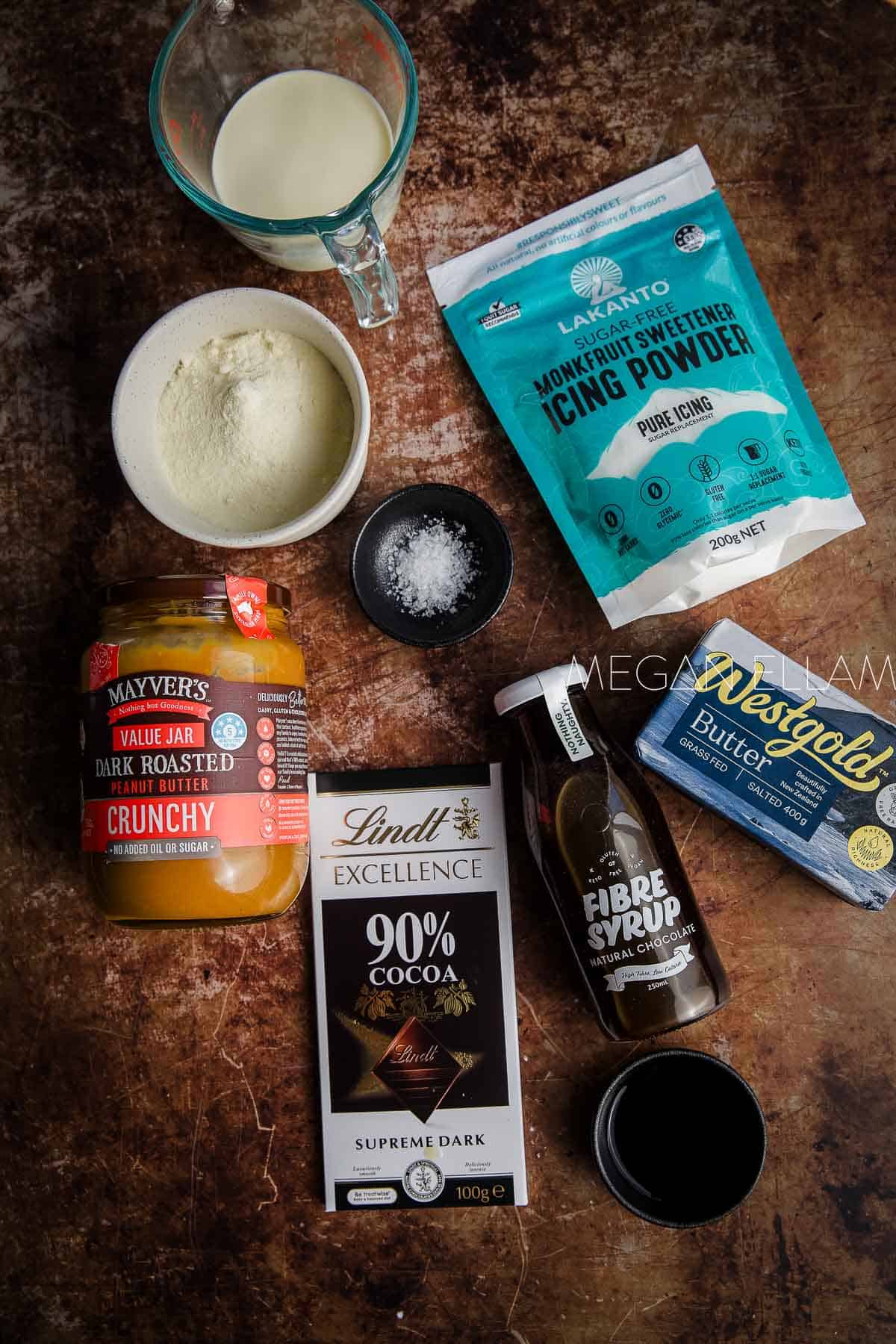
What is the Best Keto Sugar Substitute?
Today, we’re diving headfirst into the wonderful world of keto sugar substitutes. If you follow a low carb lifestyle like me, you know that finding the perfect sugar replacement can be a game-changer for your recipes and overall lifestyle.
Having been on a low carb keto diet for quite some time now, I have tried many sugar alternatives. I have found some more keto-friendly than others and some not so tasty either.
A lot of us love desserts and sweets and it can be hard to navigate what the best sweeteners are to use. I have followed a low carb lifestyle for 7 years and I have used more a few sweeteners. As a professional cook and avid foodie, I have spent countless hours in the kitchen putting a range of brands and products to the test using my recipes.
Read on for more information on the different groups of sweeteners, their taste profile and how they affect blood sugar levels and ketones.
Keto Sweeteners
The good news is there are sugar substitutes and natural sweeteners that are low in carbs and do not increase blood sugar levels.
More good news is that many of these sweeteners are being made more readily available in local supermarkets. Let’s have a look at some of the best keto sweetener options.
Stevia
Stevia is a natural keto sweetener derived from the leaves of the Stevia Rebaudiana plant. It’s hundreds of times sweeter than sugar, so a little goes a long way. Because it has zero carbs and doesn’t raise blood sugar levels, it’s a beloved choice among the keto community.
The active compounds of stevia are steviol glycosides. The body does not metabolise glycosides, making it a zero-calorie sweetener.
When using stevia, opt for the pure, unadulterated kind to avoid any hidden carbs. Many stevia products on the market contain fillers like maltodextrin or dextrose, which can affect your ketosis. So, always check the label!
Stevia does have a slightly bitter aftertaste. Keto stevia is available in powdered, granular and liquid forms, e.g., Sweetleaf Drops.
Because of the level of sweetness and its carb value stevia is often found combined with other sweeteners like erythritol. Sweeteners like Nothing Naughty, Naturally Sweet Stevia Blend, and Natvia.
My favorite stevia products are – Vital Zing (or Love My Flavor Drops from the US). They make flavored “drops” for baking, drinks, smoothies, custard, yogurt etc. A little goes a long way.
Recipes to use Vital Zing Drops: Banana Bread | Keto Custard
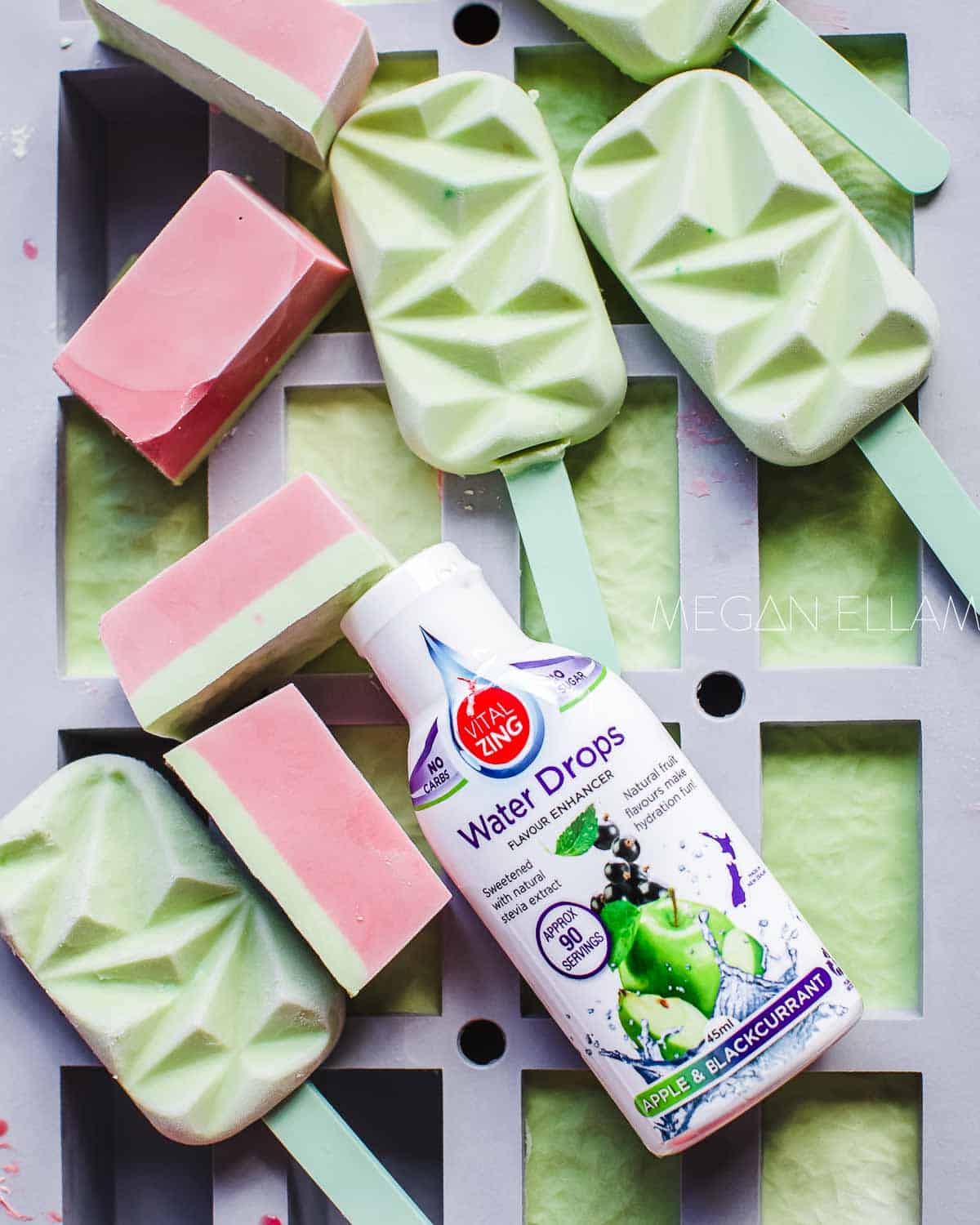
Allulose
Allulose also known as pseudo-fructose is classed as a “rare sugar” because it is naturally present in only a few foods like maple syrup, figs and dried fruit.
Allulose is a newer keto-friendly sweetener that has been gaining popularity, for good reason. It tastes remarkably similar to sugar but doesn’t raise blood sugar or insulin levels. It also has minimal calories, making it a suitable choice for those watching their calorie intake.
Allulose behaves similarly to sugar in recipes, creating the same texture and browning in baked goods. However, it’s not as sweet as sugar, so you may need to use more to achieve your desired level of sweetness.
It is a monosaccharide or single sugar. Allulose has the same chemical formula as fructose but is different in structure.
This difference prevents the body from metabolising the allulose into glucose, like fructose.
Not only making this another zero-calorie low carb sweetener but also with little to no effect on insulin or glucose levels.
The sweetener passes through the body and is eliminated through urine.
Allulose looks the same as sugar but is only 70% the sweetness of sugar but behaves much the same in cooking as sugar.
While the FDA has approved the use of allulose in baked goods in the US and for individual sales, it has yet to be approved in Australia. So, for now, we have to wait.
Recipes that use allulose: Sugar-Free Caramel Syrup | Sugar-Free Dalgona Coffee
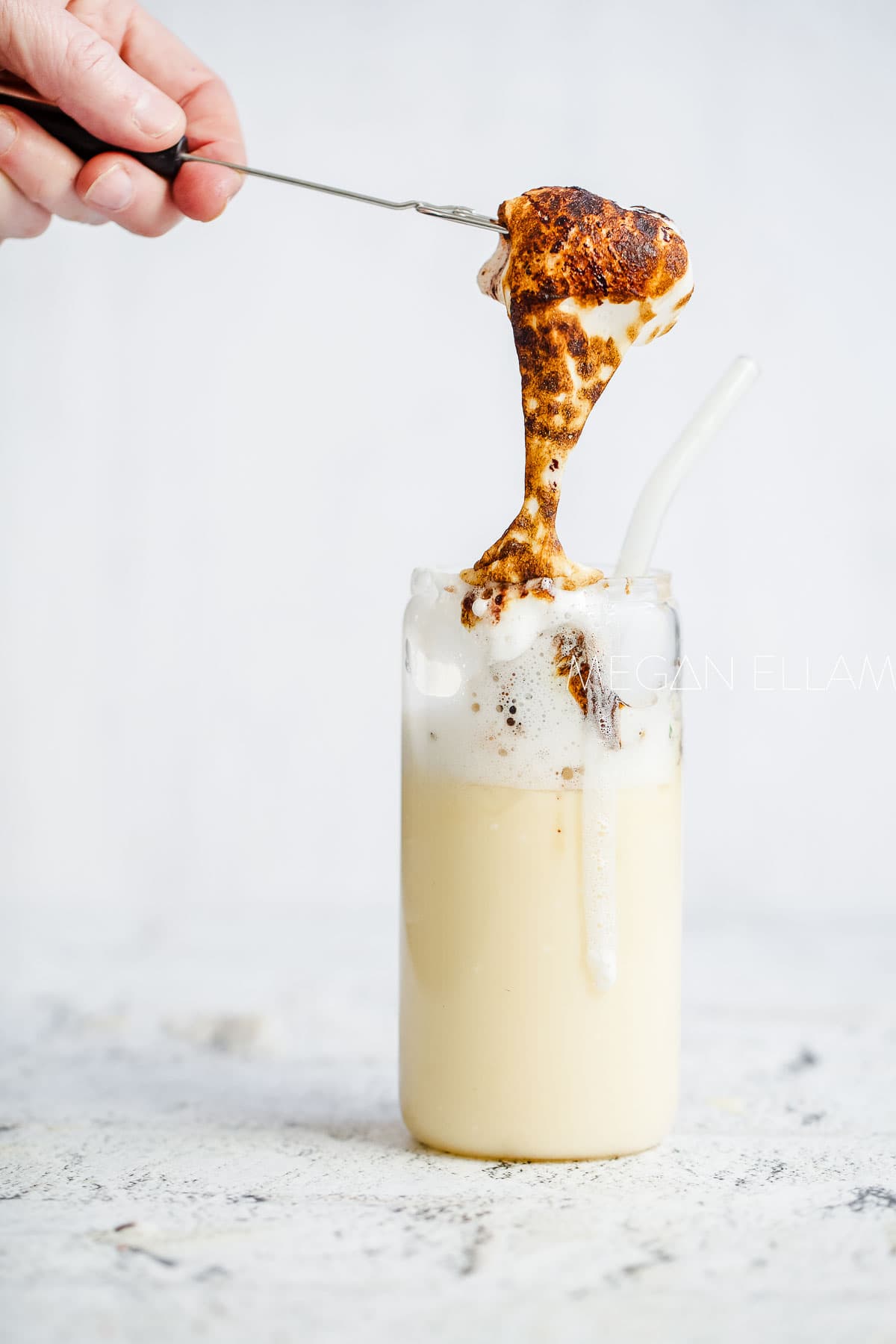
Monkfruit / Monk Fruit
Monk fruit is derived from a fruit. Monk fruit sweetener is keto friendly. It is available in liquid monk fruit, monk fruit extract and more often added to erythritol as a granular sweetener. It can be found in golden sweetener, brown sugar substitute, powdered icing mix, liquid syrups, and powdered pure monk fruit products.
Monk fruit can be from 100 – 300 times the sweetness of sugar depending on the product used.
So, it is best to experiment with small amounts of liquid keto sweetener and powders when using monk fruit in its pure form (no added sweeteners)
Because of the additional sweetness in Monk fruit like stevia it is often blended with erythritol to create a sweetener similar to table sugar.
Lakanto‘s monk fruit sweetener contains both erythritol and monk fruit. It differs from other brands as the monk fruit is bonded with erythritol rather than blended. This process is done to achieve a consistent product in its sweetness. The products also have no other added sugar-alcohols. Lakanto uses the swetener in a range of products like Dark Choc Baking Bits.
Monk fruit is another natural keto sweetener that is a better health choice due to its zero-carb and calories, and minimal effects on insulin and glucose.
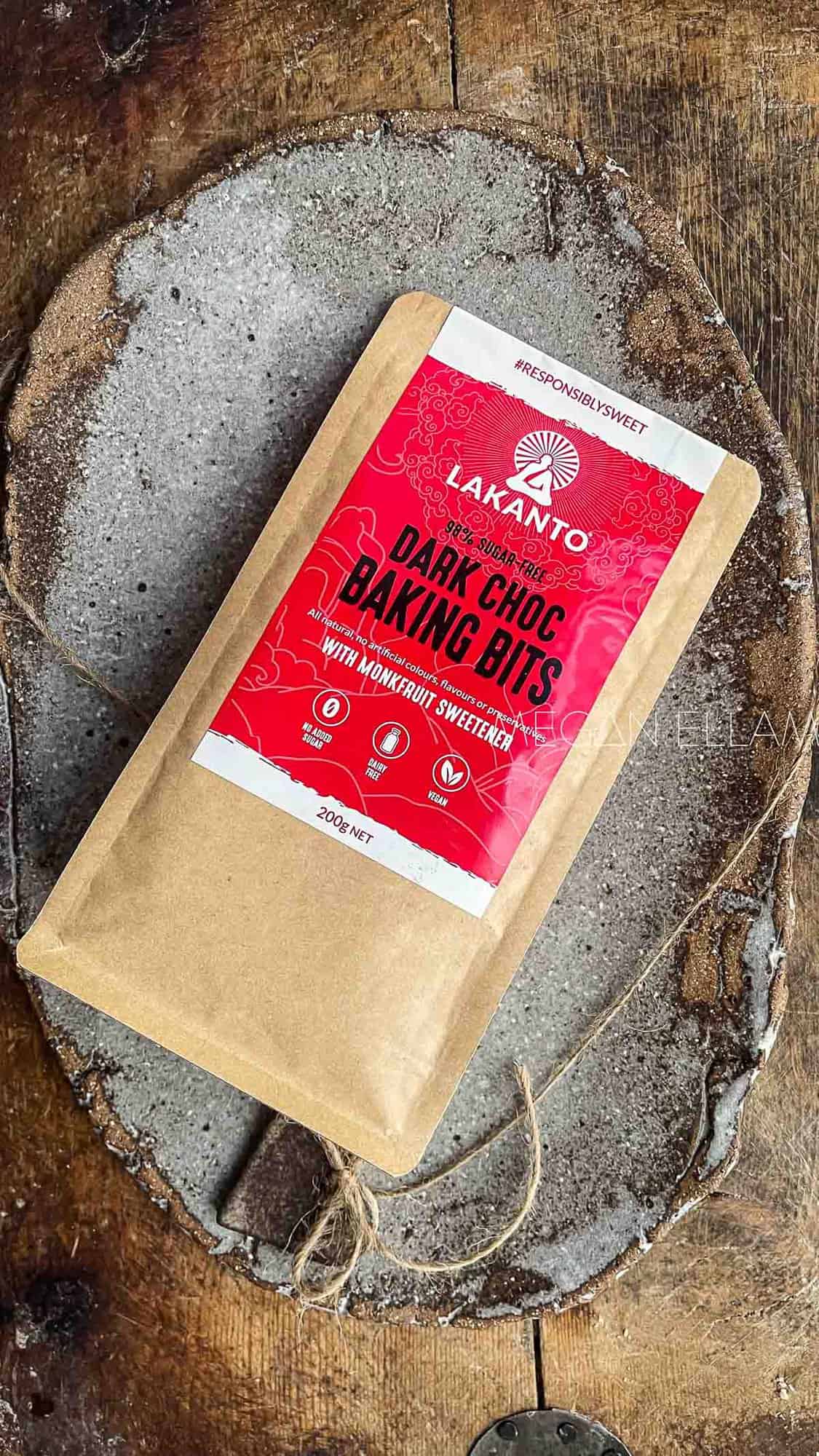
Inulin
Many of you will know this sweetener as I use it in baking and desserts like yogurt or custard.
Inulin is a prebiotic fibre with three prebiotics that can provide health benefits. Not necessarily known as a keto sugar substitute but it can work in many recipes.
The three prebiotics are fructooligosaccharide (FOS) oligofructose, and galactooligosaccharide (GOS).
Derived from chicory root, inulin is a mildly sweet dietary fibre that is often combined with other sweeteners like Swerve.
It can impart a creaminess in a recipe and a mild sweetness when used in small doses. If used in large doses it can cause a little bit of discomfort with tummy troubles.
Inulin can give a feeling of fullness and help to reduce calorie intake. It also seems to lower glucose and insulin levels after meals.
Recipes using inulin: Low Carb Bread / Thick Keto Yogurt
Sugar Alcohols
Erythritol
Erythritol is a superstar when it comes to keto sweeteners. It’s naturally found in certain fruits and fermented foods, but the erythritol used in keto-friendly products is usually made through a fermentation process from glucose. The best part? It has zero calories and doesn’t spike your blood sugar, making it a perfect choice for those on a low-carb diet.
You can use erythritol in baking and cooking just like regular sugar. It provides the sweetness you crave without the carbs that kick you out of ketosis. Keep in mind that erythritol can have a cooling effect, so it’s wise to mix it with other sweeteners for a more balanced taste.
For erythritol sweeteners, I use Sukrin granulated sweetener and Sukrin Icing. Alternatively, I use Lakanto Monk Fruit/Erythritol products.
Erythritol recrystallized after heating. In recipes like cookies, meringue, or pavlova you want this to occur. It makes the crunch like regular sugar.
You do not want to use erythritol in recipes like keto custard, or keto pudding as it can crystallise and create crunchy glass-like shards in the cooked dessert. This is also the same in recipes like cranberry sauce, sweet and sour or barbecue sauce.
Xylitol
Xylitol is a sugar alcohol often used in sugar-free gum and candies. While it has some carbs, they have a minimal impact on blood sugar due to its low glycemic index. Xylitol also boasts dental benefits, as it can reduce the risk of tooth decay. When looking for it as an ingredient please note that it can be listed as “natural sweetener”.
It’s worth noting that xylitol can have a laxative effect in some people when consumed in large quantities, so use it in moderation. Xylitol is also highly toxic to dogs.
Xylitol’s properties are useful in keto recipes. When heated and cooled xylitol does not recrystallise like erythritol and other sugar alcohols. It is perfect for recipes like, lemon curd, sugar-free jam, ice cream, and sugar-free condensed milk.
Maltitol
A sugar alcohol that is NOT keto-friendly! Even testing on myself I have found that maltitol kicks me out of ketosis.
Maltitol is 75-90% as sweet as sugar. It has very little to no aftertaste and is found in many protein and keto bars.
It should be noted that maltitol can affect blood glucose and is not recommended for diabetics. Maltitol also can cause gastro discomfort and have a laxative effect.

Keto Syrup Sweeteners
Fiber syrups are made from a plant fibre called isomalto-oligosaccharide (IMO), chicory root or IMOs have been shown to affect blood glucose levels in individuals. This product should be monitored if you are diabetic or insulin resistant.
Non-GMO corn fibre is a soluble fibre or resistant starch that passes through the body undigested. Non-GMO corn is not the same as the genetically modified corn that we consume today. Read more about insulin-sensitising effects of dietary resistant starch and effects on skeletal muscle and adipose tissue metabolism.
There are syrups on the market made with erythritol, monk fruit and other sweeteners. Most of these syrups are mostly water-based. Other brands like Sukrin or Nothing Naughty are fibre syrup sweeteners. They are very thick in consistency similar to molasses or glucose syrup. The recipes we use these sweeteners for mostly cannot be swapped for the water-based products as they do not react the same when cooked. Always check the recipe notes for substitutes or use the products suggested.
For some great recipes using these syrups try our Chocolate Caramel Slice, or Keto Chocolate Fudge
Artificial Sweeteners
Without going into them all if they aren’t on the good list above don’t bother!
Artificial sweeteners like Aspartame, Sucralose, Saccharin and many more are not worth your time. Artificial sweeteners often have numbers allocated to them on nutrition labels.
Yes, many are zero-calorie but none of them are good for you.
We should all try and reduce sweeteners where we can.
With these keto sugar substitutes in your arsenal, you can continue to enjoy sweet treats without derailing your ketogenic lifestyle. Remember, everyone’s taste buds are unique, so don’t be afraid to experiment and find your favorite sweetener. Just be sure to read labels and choose products that fit your keto goals, and do your research.
If you have any questions or want to share your keto sugar substitute success stories, drop a comment below. Happy keto baking, my friends! Until next time, keep it madly delicious!
36 responses to “Keto Sugar Substitutes”
-
Hi Megan,
Thank you for this article! My question is, how do you buy inulin sweeteners? The trade name, brand name, etc? I Googled inulin sweetener but all I got was inulin prebiotic fiber, which stated that it was not a sweetener. (I’m interested in it both as a sweetener, and a prebiotic fiber, actually.)
Thanks! -
Thank you Megan for such thorough research. It was a good read on sweeteners and I can now understand all the different brands on the market.
-
Thank you Megan for this. Much appreciated.
-
Wow, now this is how you do a write-up on various sweetners. I appreciate & thoroughly enjoyed the read. It answered a lot of questions I had about the affect specific sweetners could have on blood glucose and taught me some thungs as well.
Thanks again.:)-
Yay!
-
-
Hi Megan,
I was so surprised to find out that Xylitol is so bad!!!
What would be your recommended sweetener for coffee.
I’m thoroughly enjoying your website.-
Just test a few Maria. Xylitol can affect all of us differently
-
-
Just found your website. I haven’t had a really good chance to explore yet.
I use primarily allulose and erythritol. I like the allulose in tea and coffee. Because I can get erythritol in granulated, brown and powdered (confectioner’s) I like the range for baking.
Looking forward to more time on your website. Thank you.
-
Thank you for this summary. It will be something that I will continually refer to. I am having trouble getting hold of the fibre syrup. it appears to be unavailable or they don’t deliver to Australia. Any suggestions?
-
Hi Vanessa, Sukrin have changed to a Sukrin Syrup (no fibre) in the title. It does the same thing but is much better with no IMOs in it. They ship across AUstralia and also have various stockists across Australia. They also sell on Amazon as well.
-
-
Is there a keto-friendly sweetener that baker’s yeast can eat? In my simple kitchen experiments, the yeast will not eat erythritol or allulose. (I did test my yeast with cane sugar solution just to make sure it was still alive.)
-
I’ve heard Inulin works?
-
Sorry I am not sure what you mean? I have inulin listed as a sweetener in the list and how to use it.
-
-
-
Hi Megan
I have tried all the sweetener’s but ALL of them seem to have a laxative effect on me and I end up feeling sick …The ONLY one I seem to be able to tolerate so far is Equal and I understand you advise that it is not good for us but don’t seem to have any other choice …I also have IBS and diverticulosis, so very sensitive ….any advice ? -
What is the best sweetener to use in tea?
I currently use equal
I am very sensitive to the after taste in artificial sweeteners
Love your recipes
Many thanks
Claudia-
Hi Claudia, get some monk fruit from the super market. It is a natural sweetener and so much better for you than equal.
-
-
YOu mentioned in one of your video that you use a sweetner that does not have grittiness, can you let me know which one this was please
-
Hi Mundi, the sweetener I was referring to is Sukrin Melis. You will find a direct link to Sukrin in the post and they actually sell all the sweeteners I most regularly use. The Melis is a powdered sweetener much like icing sugar but with zero carbs and zero calories.
-
-
Hi
I have always used Hermesetas in coffee and tea. After reading your information above I realise I will have to find something else!
How would monkfruit or erythritol be in beverages?-
Monk fruit or erythritol are perfectly fine
-
-
Hi Megan. Most of the sweeteners used in you recipes, can you buy from woollies or coles? If not do I get it online from a health store i.e. iherb as I want to go shopping within the next couple of days.
-
Hi Kathleen, other than Sukrin products all the sweeteners I use just come from the supermarket.
-
-
Hi Megan, does monk fruit have that cooling aftertaste that other sweetness do? Is there a sweetener that doesn’t do that?
-
I have no issue with monk fruit at all. Allulose is the best sweetener for aftertaste but we have to import it into Australia at this time.
-
-
Hi Megan
Granddaughter is making lemon and poppyseed cake. What sweetener do you use in that recipe. She used a liquid sweetener and it had a bad aftertaste and she had trouble converting the amount.
Thank you
Dianne-
Hi Dianne, I use an erythritol based sweetener. My sweeteners of choice are Sukrin:1 or Monkfruit. I have the link within the recipes for any products I use.
-
-
Hi Megan sweeteners have long been a problem for me, I just hate the aftertaste most seem to have.. Two questions can you use Inulin in all cooking and what are your thoughts on natvia, thank you for the very interesting post
Cheers Fran 😊-
Hi Fran, I love Natvia as well. So yes you can use them in the recipes if your prefer. Inulin can be used in a lot of sweetening however when it comes to caramelising or setting “hard” it will not work. I couldnt say it can be subbed in all recipes e.g. Keto Pavlova would fail. It is just where you add a bit of sweetness say a yoghurt, mousse, etc. Plus it is the only keto “sweetener” that can activate yeast. Feel free to ask on any recipe you are thinking of trying and I will try and get back to you as soon as I can with answer for any choices of sweetener to each recipe. x
-
-
Can inulin be used to sweeten a hot drink?
I didn’t realise it was a sweetener?-
Yes it is a prebiotic with a natural sweetness.
-
-
Thanks Megan I did not know that about Xylitol and the deadly effect it has on dogs I will not buy that anymore. Where can I get Inulin from? Cheers Sally
-
Hi Sally, Inulin is available from most health food shops. I also sometimes order from iHerb.
-
-
Hi Megan, I read your report on “sweeteners” do you have any comment on “Yacon” powder or syrup, i have read it has great benefits.
I cannot seem to get a sweetener that comes close to the taste of sugar, that i dont need 2 tsp. in cup of coffee, or has an after taste.
I have tried Stevia, Monkfruit, Xylitol, Swerve you name it ive tried it and are tempted to go back to
using “Equal”. Any suggestions please.-
Hi Vonny, Yacon syrup passes through the body undigested and shoould be fine. Due to the high carb content (even though not absorbed I kind of left it off) I am happy to add it back at some point when I am not quite as under the pump as I am now. You could test it out and see how you go by monitoring ketones.
-
-
Thank you, Megan, for taking the time to write this up. It’s very helpful and confirms some of my suspicions about the effects on blood sugar levels.
-
Thanks for your feedback Judy. It is better if we all educate ourselves and do what is best for us. As I continue on this path and get older I am trying to find the best ingredients to use. I will try and keep abreast of all the information out there and share.
-

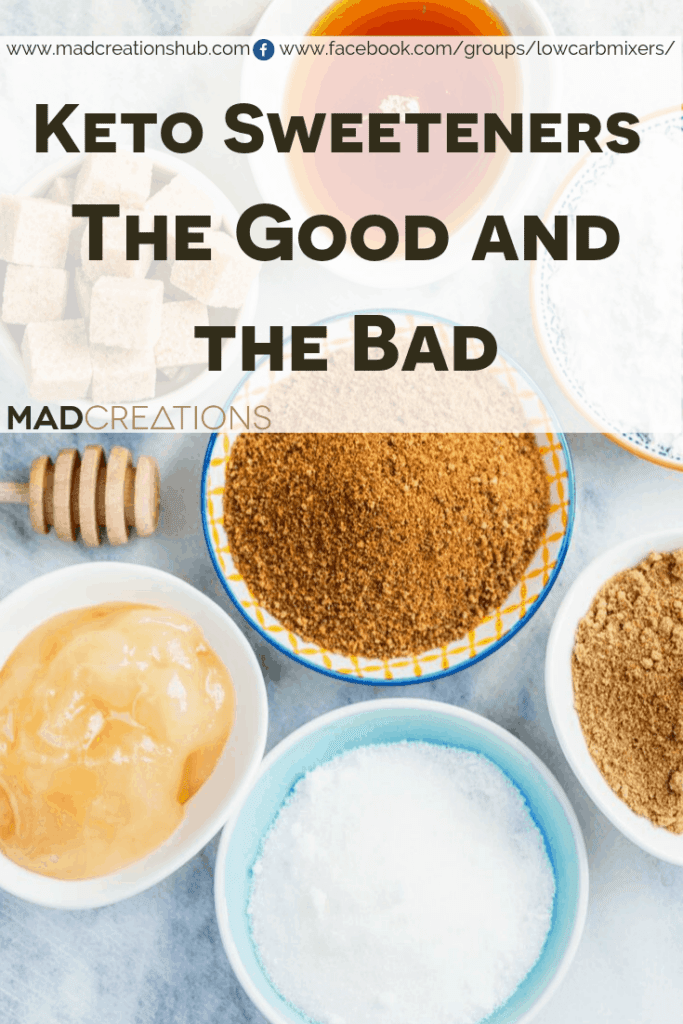
Leave a Reply